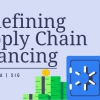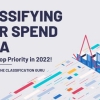Growing economic uncertainty has seen many businesses look to procurement for a means to increase savings and ultimately drive growth. This is especially true in the retail industry where common issues include mounting costs, struggling suppliers, increased competition and expanding supply chains. On top of this, savings must be achieved without affecting the quality of the end product or customer experience.
Despite these challenges, it is possible to implement strategic improvements which in turn unearth sustainable savings. Strategic sourcing fosters a more sustainable view of business spend. It combines market data and insight in a way that enables procurement to consider total cost of ownership – not simply spend and savings. This type of mind-set is necessary within retail organisations evolving in an uncertain financial climate, where constant fluctuations represent both challenges and opportunities.
The bigger picture
The level of data accessible to businesses is huge and can be leveraged in a number of ways. In this context, vendor management is often an area where retailers are able to make gains. Typically projects in this space focus on optimising processes to balance cost and risk. The key point here is not underestimating the dangers of a lack of visibility - an issue highlighted by recent investigations into M&S and ASOS with regards to child exploitation within the supply chain.
On the other hand, while it is true that suppliers are under mounting cost pressure, in many cases there is still room to negotiate. Effective cost management strategies must be based on a thorough understanding of the total cost of delivering a distinct product or service. This means breaking down and analysing the different elements involved and working with suppliers to identify mutually beneficial improvements.
Relationships and small suppliers
SRM is another key facet to strategic sourcing. As mentioned above, leading retailers value strong supplier relationships. This is not just for the security of supply they represent, but also for the possibility they offer to constantly redefine and improve processes. Setting KPIs, defining service level agreements and reviewing them together, is a proven means to identify areas for improvement. Retailers such as H&M, M&S and Primark clearly segment their supplier base, both on the basis of sustainability but also as a driver to let their suppliers understand how important they are to the retailers operations.
Finally, it is important not to forget about small suppliers when implementing a strategic sourcing programme. Whilst it is easy to dismiss small suppliers, for many organisations they represent a significant amount of spend. Ensuring that these purchases go through approved suppliers has delivered a number of our clients significant savings.
I would also recommend doing some research into who owns small suppliers. It could well be that several operate under the same umbrella corporation, opening up opportunities to implement similar management programmes.
Using the full toolkit
The retail industry is one of the most challenging to operate in. Successful businesses must contend with a number of seemingly contradictory objectives if they are to grow. Balancing the need for a secure and transparent supply chain with the ability to rapidly respond to changes in consumer demand, is seldom a simple task. Particularly in a sector where total costs often add up to close to 80% of net revenue.
In this context, strategic souring programmes offer an invaluable opportunity to cut costs and ensure maximum value. Designing and building a comprehensive programme that will deliver sustainable savings over an extended period of time needs to be based on the individual make-up of the retailers’ operations.
Typically, we see a range of influencing factors that are important to building such a programme. For many retailers, these are likely to include stock planning and inventory management, long-term category management and strategic sourcing plans as well as an understanding and analysis of how they interact with their suppliers. These elements coupled with clarity around the level of procurement sophistication within the category and sourcing operations allows for the building of a more comprehensive programme.
To truly drive this value over the longer term, programmes need to have a duration that will not only cover one complete buying cycle but will also allow sufficient time to develop and implement robust sourcing processes and procurement practices where they do not already exist.
Retail, because of its inherent speed, suggests that programmes that are designed to be Agile and Lean are likely to deliver in a more optimal fashion. The speed factor is different to most other sectors and therefore the function of procurement must reflect this in the types of programmes that they deliver.
Process and flexibility as functions of Lean and Agile programmes tend to come to the fore as they act as enablers to assist the more traditional procurement functions in unlocking value and savings over the longer term. Utilising process redesign has shown both tangible benefits in allowing both, the category and procurement functions to work far more quickly and also allowing the reduction of repetition in product design and specification, thus allowing for other procurement levers to be applied during the negotiation process.
A one-size-fits-all approach to programme design for strategic sourcing is normally not the right methodology within the retail environment. Building a programme with a combination of elements, focusing on the individual retailers’ operations, has been shown to deliver a significantly higher return on investment and demonstrably higher level of sustainable savings.
Modern retail continues to throw up interesting and complex challenges for procurement, particularly when the economic climate remains unstable. Bringing a wide variety of tools to help the situation including a revamped sourcing strategy, effective vendor management, the latest in sourcing technology and a holistic approach to cost management, will all prove to be invaluable components of the modern retail procurement function.









